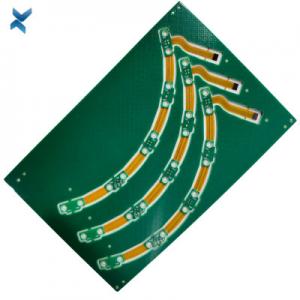

Add to Cart
Rigid-Flex printed circuit boards are boards using a combination of flexible and rigid board technologies in an application.
The proper application of Rigid-Flex circuit boards offers optimum solutions for difficult, limited space conditions. This technology offers the possibility of a secure connection of device components with the assurance of polarity and contact stability, as well as a reduction in plug and connector components.
Additional advantages of Rigid-Flex circuit boards are dynamic and mechanical stability, the resulting 3-dimensional freedom of design, simplified installation, space savings, and maintenance of uniform electrical characteristics.
Layers: 8L rigid flex pcb
Board Thinkness:0.69mm+/-0.1mm
PCB thickness in flex section:0.5mm+/-0.05mm
Base Material:PI+FR4pp
Min laser Holes:0.075mm(3mil)
Min mechanical Holes:0.15mm
Minimum Line Width/Clearance:0.046mm/0.046mm( 1.8mil/1.8mil)
Minimum Clearance between Inner Layer PTH and Line: 0.175mm
Size:160.92mm×145mm
Aspect Ratio:4.6 : 1
Surface treatment:ENIG
Speciality: rigid flex pcb multilayer fpc HDI Any-Layer PCBs stacked vias, Fine circuit 1.8mil, High Density Interconnect PCB 1.8mil/1.8mil,Laser via copper plated shut
Differential impedance 100+7/-8Ω
Applications: Medical stimulator
YS Rigid Flex PCB manufacturing capabilities overview
| Feature | capabilities | |
| Layer Count | 2-20L | |
| Rigid-Flex Thickness | 0.3mm-5.0mm | |
| PCB thickness in flex section | 0.08-0.8mm | |
| copper Thickness | 1/4OZ-10OZ | |
| Minimum line Width and Space | 0.05mm/0.05mm(2mil/2mil) | |
| Stiffeners | Stainless steel,PI, FR4 etc. | |
| Material | Polyimide Flex+FR4,RA copper, HTE copper, polyimide, adhesive,Bondply | |
| Min mechanical Drilled Size | 0.15mm(6mil) | |
| Min laser Holes Size: | 0.075mm(3mil) | |
| Surface Finish | Suitable Microwave/RF PCB urface finishes: Electroless Nickel, Immersion Gold, ENEPIG, Lead free HASL,Immersion Silver.etc. | |
| Solder Mask | Green, Red, Yellow, Blue, White, Black,etc. | |
| Covrelay (Flex Part) | Yellow Coverlay, WhiteCoverlay,Black Coverlay | |
FQA
1. Do you offer double-layer flexible PCB?
Yes, we make single layer flexible PCB, double sided flexible PCB,
multi-layer flexible PCB, and Rigid-Flex PCBs.
2. Do you provide stiffeners and cover films?
Yes, we provide black PI stiffeners, yellow PI cover films,
transparent polyimide films, white overlay, and brown PI copper
clad laminates.
3. Do you use adhesive free copper foil base material?
Yes. We have four manufacturing methods for adhesive-free copper
foil base materials. We use spray plating, curtain coating,
electroless deposition/electrolytic plating, and laminating.
4. Which IPC standards do you follow?
IPC Standards for Rigid and Flexible PCBs
The list of IPC standards below applies to rigid PCBs and flex
circuits. Take note that this list is not exhaustive, and
additional IPC standards may need to be considered.
You should consult the ipc.org website for a full list of available
IPC standards.
IPC-2221A, Generic Standard on Printed Board Design
IPC-2223, Sectional Design Standard for Flexible Printed Boards
IPC-4101, Specification for Base Materials for Rigid and Multilayer
Printed Boards
IPC-4202, Flexible Base Dielectrics for Use in Flexible Printed
Circuitry
IPC-4203, Adhesive Coated Dielectric Films for Use as Cover Sheets
for Flexible Printed Circuitry and Flexible Adhesive Bonding Films
IPC-4204, Flexible Metal-Clad Dielectrics for Use in Fabrication of
Flexible Printed CircuitryIPC-6013, Qualification and Performance
Specification for Flexible Printed Wiring
5. What is the function of the flexible circuit board?
The functions of flexible circuit boards can be divided into four
types: Lead Line, Printed Circuit, Connector, and Integration of
Function.
The use covers computers and computer peripherals—auxiliary
systems, consumer electrical appliances, automobiles, etc.
After the circuit is completed with single-sided PI copper-clad
material, it is covered with a protective film to form a flexible
circuit board with only a single-layer conductor.
6. Rigid-flex PCB vs. rigid PCBs and flexible PCB, What are the
differences?
As the name suggests, rigid-flex PCB is a mixture of rigid and
flexible PCBs.
Rigid-flex PCBs combine the excellent qualities of both while
eliminating many of their limitations.
Rigid-flex PCBs combine flex circuit design with rigid materials.
By layering the flexible PCB board inside the rigid printed circuit
board material, the versatility of the flexible printed circuit is
finally combined with the stability, strength, and circuit wiring
density of the rigid printed circuit board.
This mixing opens possibilities for more complex and mechanically
challenging rigid-flex PCB designs.
Rigid-flex PCB simplifies the electronic design by eliminating
flexible cables, connectors, and discrete wiring.
Its electrical performance has been enhanced compared to its
counterparts because the circuit is an integral part of the overall
structure.
All electrical and mechanical connections are contained in the
rigid-flex PCB, providing electronic designers with greatly
improved service reliability and electrical performance.
Although the cost of rigid-flex PCBs is usually higher than
flexible PCBs and rigid PCBs.
However, rigid-flex PCBs’ reliability, weight reduction, strength,
and space-saving advantages are generally ideal in specific
applications and are superior to any other electronic packaging
technology.
Ultimately, rigid-flex PCB provides the best benefits of rigid PCBs
and flexible PCBs in one solution.
7. How you work with YScircuit?
Step 1: Submit or Send your PCB files (Gerber) and requirements to
sales@yscircuit.com, and our customer support will reply you within
2 hours.
Step 2: You will get the official quotation from YScircuit within 6
hours.
Step 3: Place your order and our enginner will review the Gerber
and comforming you with the EQ, and then, the production will
start.
Step 4: Quality check and arrange the shipping by courier.
